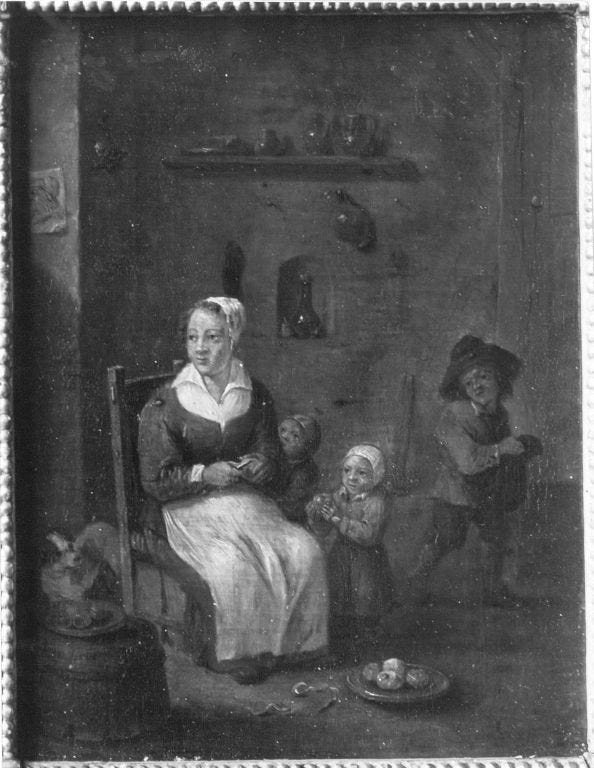
Here is a little something for you on the first Sunday in Advent (though the idea came to me late, so by the time you see it, it will probably be Monday). Near the end of my post yesterday about Peter Rosegger, I suggested that someone should really translate one of his best novels into English. I don’t have time for that, but it occurred to me that he must surely have some Christmas stories that would be appropriate at this time of year. So I poked around a bit in my office and found one that isn’t too long, about ten pages—just the right length, I thought, to divide into four installments and translate one part for each of the four Sundays in Advent, leading up to Christmas. I believe the story appeared for the first time in 1908, in Rosegger’s literary magazine “Heimgarten”; I also tracked it down in the fourth volume of his “Waldheimat,” a collection of stories from his childhood and adolescence. I don’t think it has appeared before in English, but if you know of a translation, I’d love to hear of it. Following is part one of the story; the second installment will come in a week. Enjoy!
The First Christmas Tree in the Forest Home
Part 1
“You’ve come after all! We already figured, the weather…! Little Nicky was already bawling, thought you could get stuck in the snow. Ah, it’s just good that you’re here. What can I get you? Scrambled eggs? A coffee? I’ve even got Christmas Gugelhupf cake already.”
Do you know her? You don’t recognize her? Of course—that’s mother’s voice!
It was the first Christmas holiday of my student years. For weeks now I’d been counting the days, finally the hours, until the morning of my trip home from Graz to Alpl. And then when the day came, it stormed and squalled so much that my train got stranded a few stations before Krieglach. So I climbed out and continued on foot, jolly and full of energy, for six hours through the valley, where the frost seemed to slice my nose and ears right off so that I couldn’t feel them at all anymore; and then up through the mountain forest, where I grew so heated that suddenly the ears were right back again and hotter than they ever were in summer. I forgot about the nose, although it was securely in the middle of my face, right where it stands to this day. I was also lugging along my bundle of books, for the professors had been cruel enough to assign me homework, especially in math and grammar, for which even today I could nurse a blood feud if they weren’t such entirely bloodless sciences.
Just as dusk was falling, therefore, I made it happily to the top, where the old house, shimmering through the flurries and fog, stood like a blurry fleck, solitary amid a desert of snow. As I stepped inside, how small and humble the room seemed, how dark and warm—and how primordially homelike. In the houses of a city, you completely lose your sense of what a forest farmhouse is like. But you quickly feel at home in it again when mother, without any fuss, greets the newcomer with a “Well, well, how good that you’re here!”
The fire was crackling on the old stone oven; in the parlor, mother lit a candle.
“Mother, no!,” I objected, “just light a splint instead, that’s prettier!”
But she didn’t do it. The light of a burning splint is for the workday. But for mother this was a holiday, because her son had come home after a long absence. Thus the more festive candle.
And for me, now it was really a holiday!

When my eyes had grown accustomed to the dim light, I also saw Little Nicky, my eight-year-old brother. He was the youngest, and the last of us. He stood there just like a small tree in his little pressed pants and of course was sucking on his finger. His black eyes were wide open and very round as he gazed upon me in astonishment. The person for whose sake he’d already been bawling was now there, and his trustfulness surfaced only gradually. Even when I beckoned him over to the coffee, his confidence was not yet far enough advanced for him to exchange his finger for a piece of the Gugelhupf.
“You’re looking good!” exclaimed mother, praising my cheeks, which were red from the snowstorm. She had her familiar face, which looked neither good nor bad—the old, sweet, sorrowful yet light-hearted maternal countenance. I never stared directly at this face for long, but always only with furtive glances—there was always a certain bashfulness there, with her just as between two secret sweethearts. I was never tender with her, but also never coarse—and this time, at my homecoming, we simply offered each other our hands. But how good I felt! Good enough to shout for joy, good enough to cry. I did neither, I remained quite calm and spoke of indifferent matters.
Little Nicky looked pale. “You’re the one with the city color, not me!” I said, and I laughed.
Part Two coming in a week! Thanks for reading, and I’ll see you next time for another installment From My Bookshelf.



